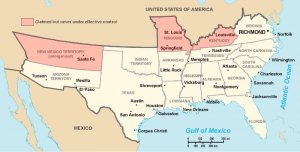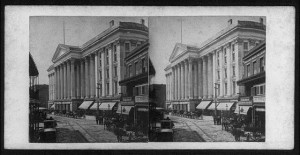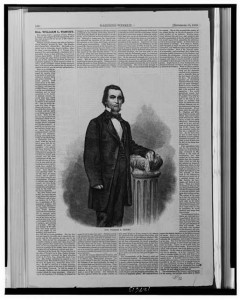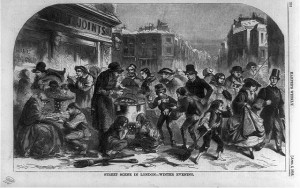The well-known fire-eater William Lowndes Yancey has returned from a year-long diplomatic mission to Europe. He failed to get either England or France to recognize the Confederacy. Yancey stopped at New Orleans on his way to Richmond to take his place in the Confederate senate. He gave a speech that summarized his European mission. Europe looks down on the South because of slavery but knows that Yankees are a bunch of hypocritical liars. The continental powers want the war to drag on as long as possible so that the up-and-coming American nations are severely weakened. Like many other southerners he seems to say that the blockade is a good thing because it will make the CSA more self-reliant. Yancey says that Europe would intervene to prevent the South from being subjugated. On the one hand, he admits that American cotton is not king because of a huge worldwide supply; on the other hand, he says that Europe will intervene to raise the blockade because only American cotton is compatible with the manufacturing machinery in place in Europe. Yancey closed his remarks by emphasizing self-reliance and unity.
From the Richmond Daily Dispatch March 24, 1862:
Mr. Yancey in New Orleans.
We copy the following from the New Orleans Delta, of the 14th inst.:
Yesterday Mr. Yancey arrived in the city from Berwick’s Bay, via the Opelousas Railroad, and stopped at the St. Charles. In the course of the evening, billing in the rotunda of the hotel, and a large impromptu assemblage of gentlemen having collected, he was called out and almost forced to make some remark. He mounted the centre-table, looking remarkably well after his voyage, and commenced, as, indeed, he continued throughout nearly the whole of his remarks, in a style perfectly free from passion, and remarkable for calm conviction and confidence in our cause.
It was one year, lacking two days, since he had quit our hopes, and he was glad to stand among his countrymen again. He came back convinced that we had no friends in Europe, that we must fight the battle alone, and rely only on our firm hearts. (Applause)
They looked coldly upon the South because of its slavery institutions. There was not a country in Europe which sympathized with us. Even the great principles of our revolution were not understood by them any more than by the Northerners, who have never been able to seize the true spirit of our institutions. With the North Europe believed in the unqualified supremacy of government, not understanding that government is made for the people. They have, therefore, got no friendship for, nor sympathy with us; neither have they however, for the North.
They regard the North, as a people, mendacious, unjust, and hypocritical. They do not believe a word said either by the people, the press, the Cabinet, or the President. Europeans are prejudiced against slavery, but they do not wish to deprive men of their property without honestly paying for it; they have no idea of cutting the chains of bondage with a lawless sword. They have discovered the Northern motive in this war to be political, not social; not a strong principle against wrong, but a determination to rule.
Having, therefore no sympathy for us, and turning with honest contempt from the hypocritical Yankee, they would look with positive indifference on the contest but for their own interests involved. They desire to cripple a dangerous rival. This country was getting too vigorous, and they are determined that it shall forever remain separated. They would never allow the South to be subjugated, and would interfere to prevent such a result, but that they feel certain it cannot be accomplished. They know and say the South will be free. In the meantime, they wish to see the war drag on until each side is thoroughly exhausted, and overwhelmed with a debt which shall crush its energies for years, or, if possible, ages to come.

Unrecognizable - at least not until "our blood-reeking sword (is) stretched over a conquered and prostrate North."
To further this policy they ignore the well established fact that the blockade has been run at least a thousand times. They set aside, practically as against us, the plainest behests of the European treaty which fixes the law of blockade. They are determined, in the face of all law, of all equity of all humanity, not to recognize us until the last possible moment, and will never do so until they see our blood-reeking sword stretched over a conquered and prostrate North.
[Here the speaker was interrupted with cries of “We don’t want it, then;” “D — n them, they can let it alone,” &c.]
As to the blockade said Mr. Yancey I don’t know that we should want it raised. If it continued six months longer, he would not, on any consideration, wish such a misfortune as that it should be raised. By that time our internal energies will have been developed, our manufactures established, and he had such confidence in the ingenuity and enterprise of our people as to believe them capable of attaining within themselves, all necessary ends. As to luxuries, indulgence in them was not becoming to a people laboring in the very throes of a heroic struggle. [Emphatic applause] …
One principal ground of miscalculation here as to the blockade had been the idea that cotton is king. …
We cannot look for any sympathy or holp from abroad. We must rely upon ourselves alone. Men and women — I beg their pardon, said Mr. Y., the ladies are ever foremost, and when they are first, men should not be laggards — all must work. I return and find your regular Government fully organised for six years. Some may say you have made had selections. It is not now the time to amend.–all are embarked in the same ship together. The storm is raging around her; the thunder is bursting over head; angry waves are dashing against her sides, and all must stand together. It there is any insubordination, any mutiny, all will sink together.
Through at his speech Mr. Yancey was warmly applauded, and evidently held the warmest sympathy of his audience, especially at these places where he expressed indignation against the injustice of foreign Governments. After the conclusion of his remark, we understood him to say, in conversation, that he would advise the immediate recall of all our representatives and evolve in Europe.
Mr. Yancey leaves immediately for Richmond.
The Richmond Daily Dispatch on March 25, 1862 commented on Yancey’s address by citing one of Aesop’s fables that stressed the importance of self-reliance: “when a man ceases to depend upon others, and takes his affairs into his own hands, his business is pretty sure to be done.” Harper’s Weekly on April 26, 1862 noticed some contradictions: “Having shown that the rebellion is hopeless, Mr. Yancey closed by expressing the strongest confidence in its success.”



